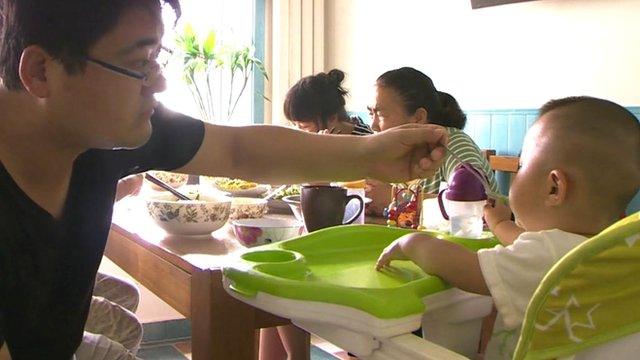Why Shanghai's first American Chinese restaurant is taking off
- Published
WATCH: Why diners are flocking to Shanghai's first American Chinese restaurant
Quick! Which of these menu items can be included in a typical Chinese meal?
Egg Foo Young?
Chicken Chow Mein?
Hot and Sour Soup?
None of the above.
Your answer will probably depend on where you live in the world. Those inside China would probably argue that none of those dishes resemble anything from a traditional Chinese menu.
But others might disagree.
For them, the idea of "western Chinese food" isn't an oxymoron, it's a genuine style of cuisine primarily developed by generations of Chinese immigrants to the United States.
Now, one restaurant in Shanghai is trying to bring American Chinese food back to China.
The Fortune Cookie
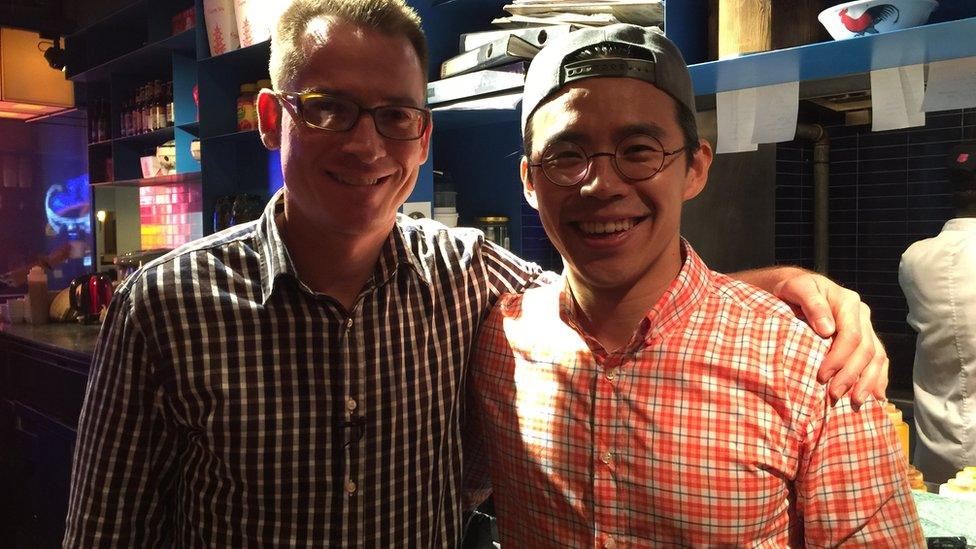
Fortune Cookie owners Dave Rossi and Fung Lam
The Fortune Cookie is the brainchild of two friends, Fung Lam and Dave Rossi. Fung was born on the doorstep of New York's Chinatown.
"I was in the playpen of the kitchen of my parents' restaurant, of my grandparents' restaurants," he recalls. "All my earliest memories were of the woks going, my dad coming home with the smell of Chinese food."
Fung met Dave at graduate school. Outside of class, they soon discovered a shared love of American Chinese restaurants.
"Friday night was Chinese food night in the Rossi household," Dave explains. With more than 40,000 American Chinese restaurants in the United States, families of all ethnic backgrounds grew up eating New World Chinese classics.
When visiting Shanghai as tourists, Fung and Dave missed their usual versions of noodles and stir-fried classics, and thought others might too.
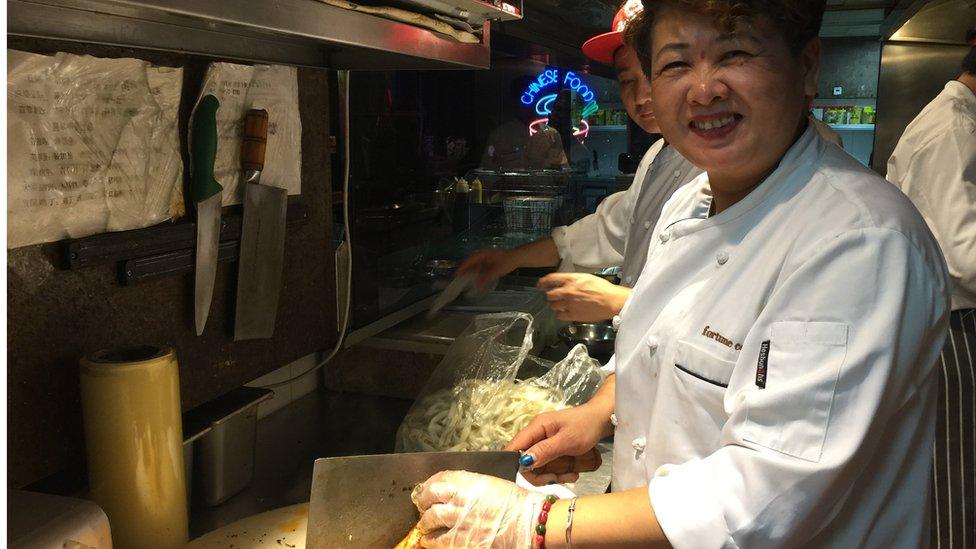
Chefs working at Fortune Cookie had to re-learn everything they thought they knew about cooking Chinese food
They decided to open what they believe is Shanghai's first American Chinese restaurant, featuring specialties served in Fung's family restaurants for 40 years: orange chicken, kung pao chicken and sesame shrimp. Dave describes the menu as "really American".
American yes, though a version of this menu is served in Chinese restaurants around the world - from Madrid to Melbourne.
But not usually in mainland China.
Dave and Fung flew Fung's father over to Shanghai to teach the chefs how to make each dish, so it is exactly the same as the food served in the family's American restaurants.
Extra American effort
One of the biggest challenges was finding the right ingredients to use in the kitchen.
"As weird as it sounds, we actually import a lot of ingredients to make authentic American Chinese food in China," Fung says
Items like Philadelphia cream cheese, Skippy peanut butter, cornflakes and English mustard powder must all be brought in from outside China. Even the soy sauce must be imported from Hong Kong, because that's what the first Chinese immigrants to the US used in their cooking.
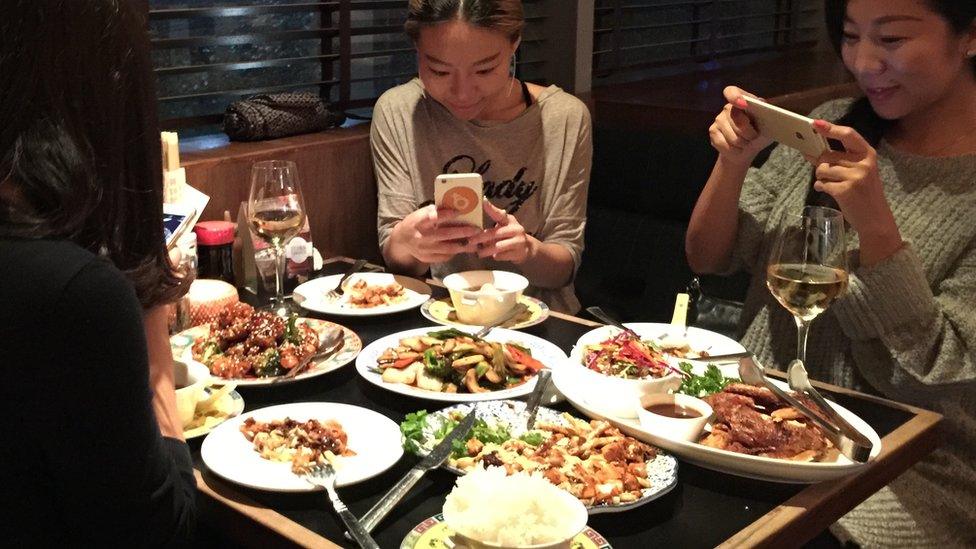
Young Chinese diners frequent the Fortune Cookie for its take on so-called American Chinese fare
The extra effort appears to be worth the trouble. The restaurant is usually packed on week nights and on the weekends, long lines of customers can stretch out of the door.
Dave and Fung have learned to predict whether first-time customers will approve of their food.
"If you're an expat, 99% of the time you're going to be happy. When it's a younger local person, we have maybe a 70% success rate," Fung explains.
Some locals come into the restaurant and ask for their food to be served in American-style white cardboard takeaway containers, mimicking meals they've seen on sitcoms like Friends and the Big Bang Theory.
Not everyone's taste
But not everyone approves of the Fortune Cookie's offerings. When an older person from China walks into the restaurant, Fung explains, "unfortunately, our success rate is much lower."
Westernised Chinese food certainly has its critics. Some say the food is too sweet, its sauces too thick and gloopy, even too orange - a world away from the complex flavours of the vast array of foods found across mainland China.
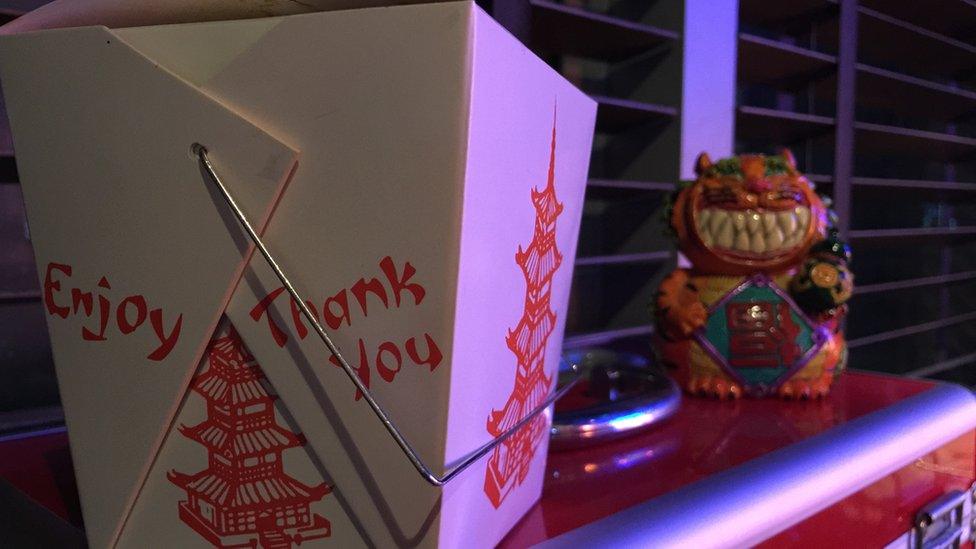
Many young Chinese diners want to eat from the iconic Chinese food delivery boxes they've seen on American sitcoms.
Tourists to China are often surprised when they taste the local food for the first time. If they grew up eating Hot and Sour soup or Lemon Chicken, the food that's on offer in any Chinese city might come as a shock.
Long-time expat Jamie Barys operates UnTour, a service offering street food tours - revealing the hidden secrets of Shanghai's favourite local haunts. She delights in challenging tourists' presumptions about what comprises a typical Chinese meal.
"They're blown away by how different it is than the Chinese food they're used to. You do get some deep fried stuff but for the most part, Chinese food is very refined. There is a lot of thought behind it."
What is the biggest misconception about Chinese food in China? Jamie answers without hesitation.
"Eating dog, definitely eating dog and cat. We ask people if they have any dietary restrictions of food allergies and I think one in 10 say, "no dog"
It is almost impossible to find a restaurant that serves dog anywhere in Shanghai, Jamie says.
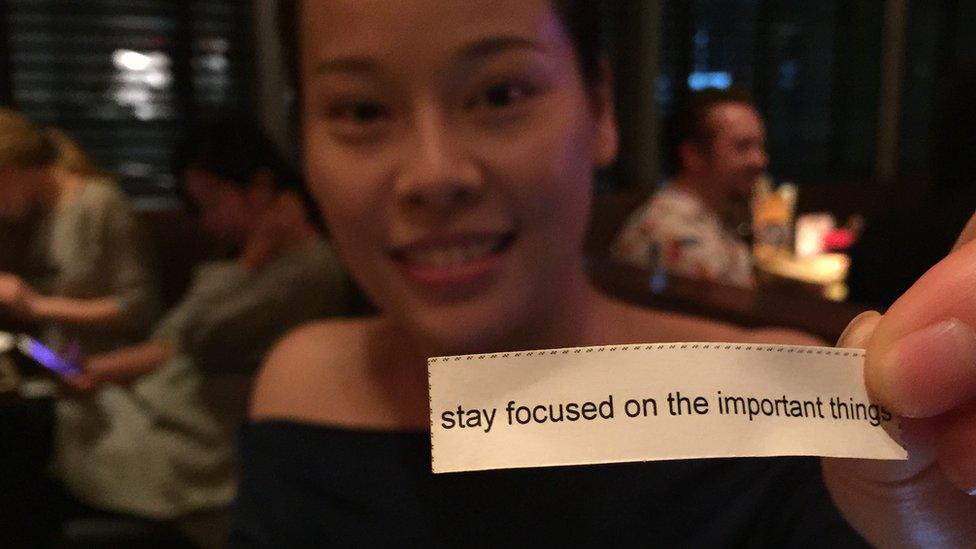
Dave and Fung write their own fortune cookies
Instead, she encourages tourists to try Xiao Long Bao - Shanghai's famous soup dumplings - and Jian Bing - a savoury egg pancake in a crunchy millet wrapping.
But those who come to the Fortune Cookie again and again know what they're here for: it's a meal that ends with the Fortune Cookie's namesake.
Fortune cookies aren't found in China, so Dave and Fung had to write their cookie messages themselves.
In place of Confucian wisdom, they've come up with more current wisdom. "Call home. They miss you," reads one scrap of paper. "Dance like nobody is watching," urges another.
Fung and Dave plan to stay in Shanghai for a while and possibly open up more locations. They'll continue to challenge assumptions about Chinese food, one serving of Orange Chicken at a time.
- Published11 November 2015
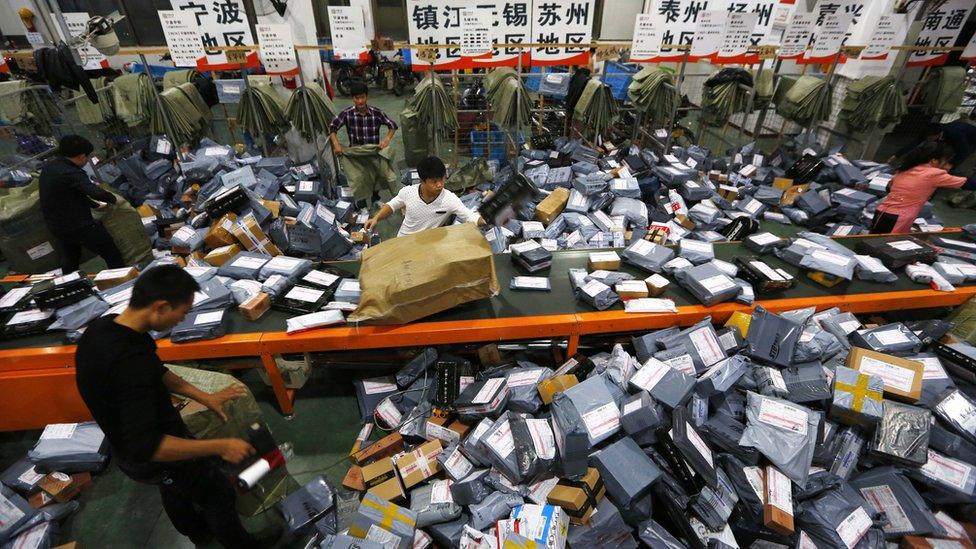
- Published30 September 2015
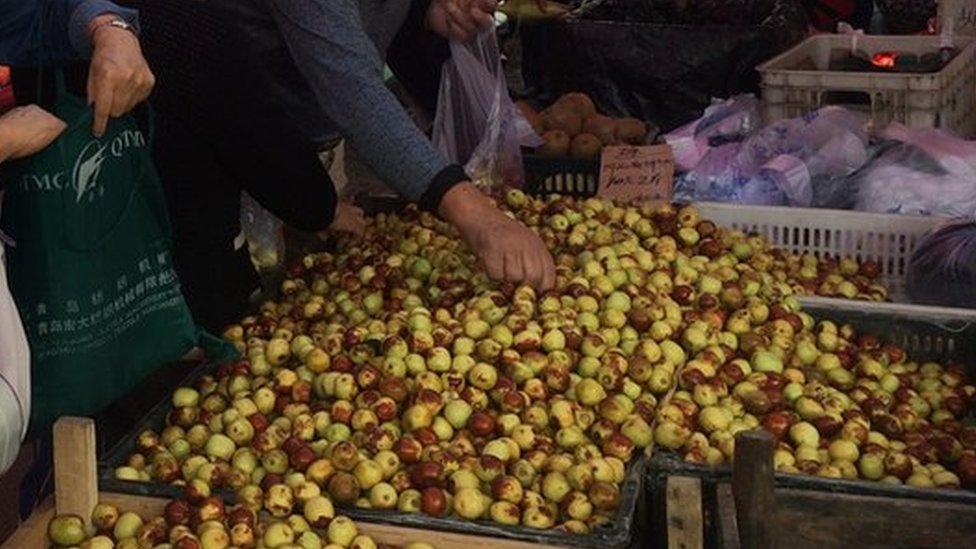
- Published9 October 2015
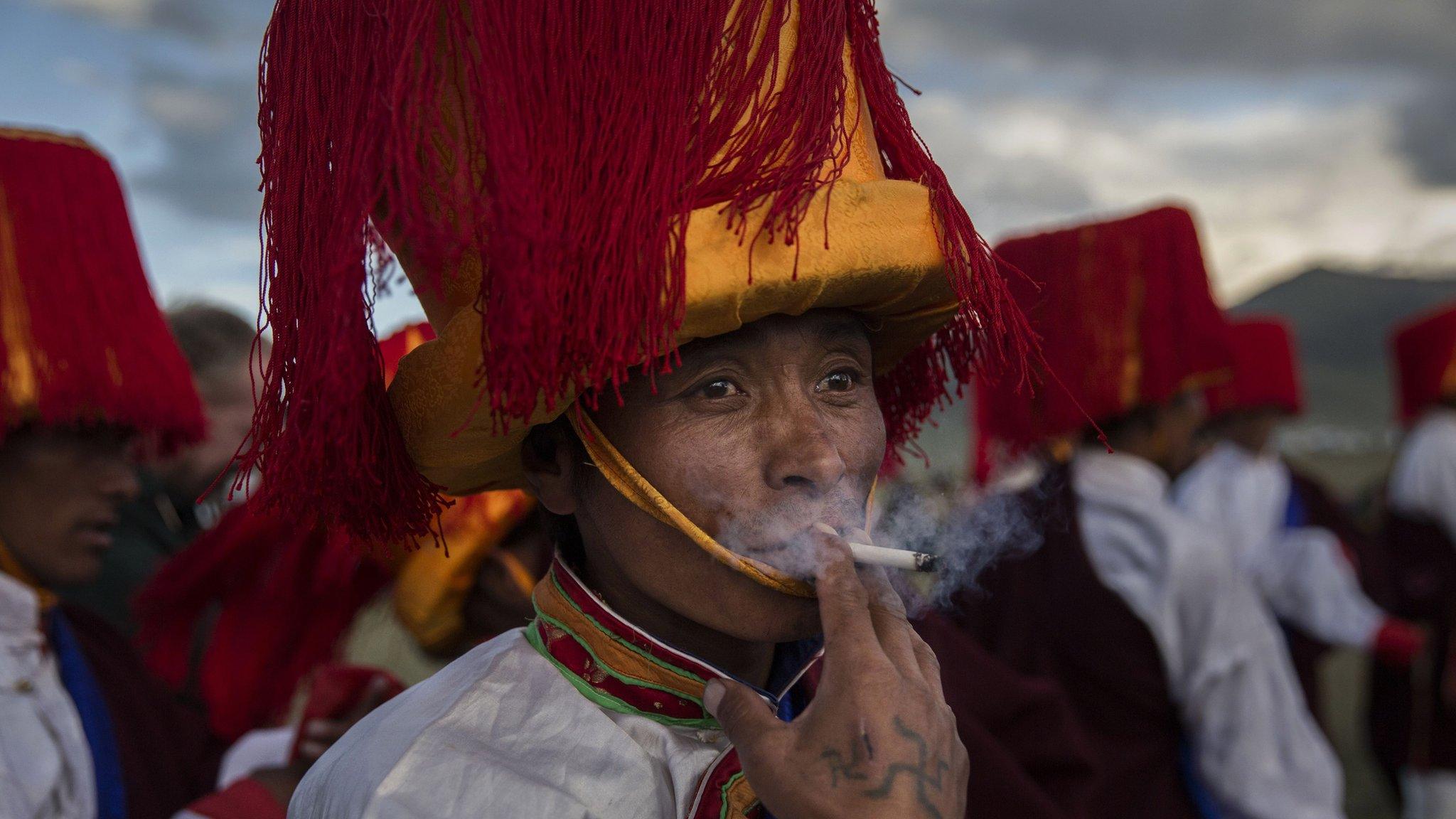
- Published17 July 2013
